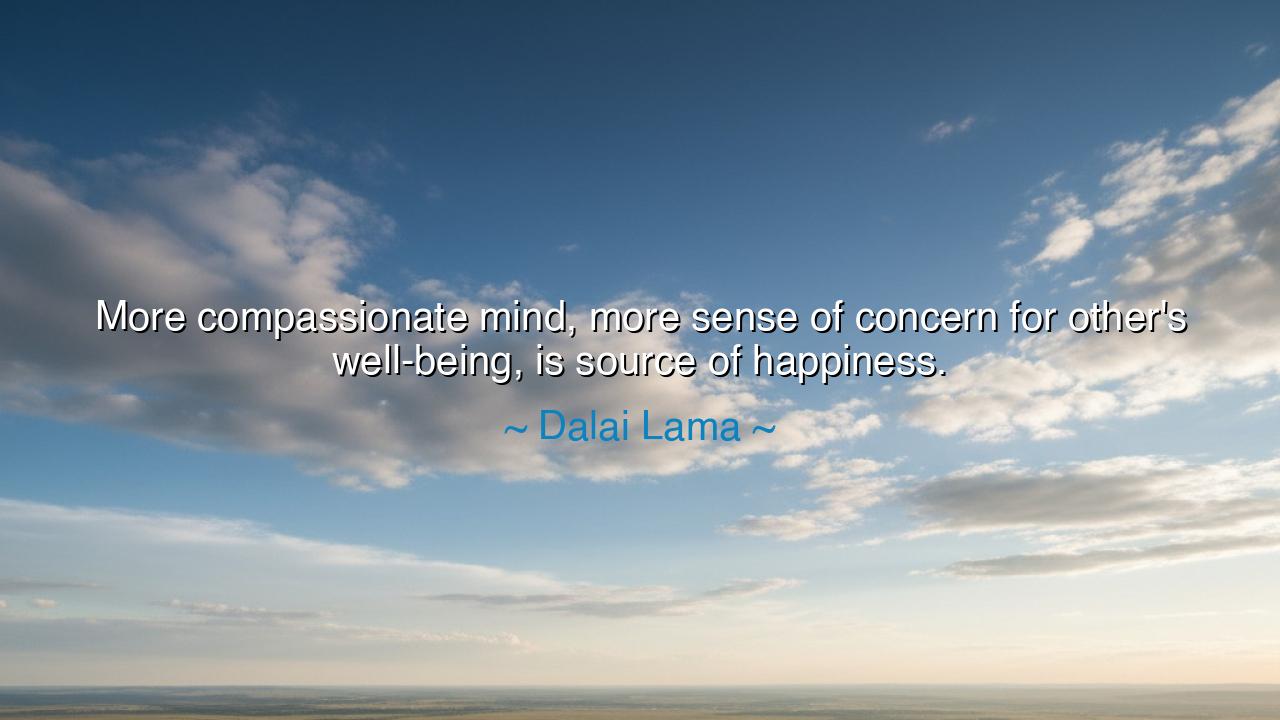
More compassionate mind, more sense of concern for other's
More compassionate mind, more sense of concern for other's well-being, is source of happiness.






“More compassionate mind, more sense of concern for other’s well-being, is source of happiness.” Thus spoke His Holiness the Dalai Lama, the gentle sage of Tibet, whose words carry the stillness of mountains and the warmth of sunrise. In this short yet luminous saying lies a truth as ancient as the human heart itself: that compassion — not wealth, not power, not pleasure — is the true source of happiness. The Dalai Lama does not speak of compassion as an ornament to the soul, but as its very essence. When the mind softens toward others, when it seeks not only its own good but the good of all beings, it finds peace. For only the heart that gives can ever rest content.
In the age of the Buddha, the same truth was spoken beneath the Bodhi tree: that suffering ends when separation ends — when the illusion of “I” and “you” dissolves into unity. To cultivate a compassionate mind is to awaken to that unity. The Dalai Lama, heir to this timeless wisdom, reminds us that happiness does not arise from getting what we want, but from wishing others well. A life lived for the self alone grows small, anxious, and brittle. But a life that opens toward others — that feels their joys, their fears, their hopes — expands like the dawn sky, radiant and infinite.
This teaching has its origin not only in philosophy, but in the lived experience of the Dalai Lama himself. Exiled from his homeland, separated from his people, and burdened with the sorrow of his nation, he could have turned bitter. Yet he chose love over hatred, compassion over despair. When asked how he could smile after such loss, he replied simply: “My enemy is my teacher.” For in each moment of pain, he found an opportunity to deepen his compassion. His happiness, therefore, was not built upon comfort or ease, but upon the unwavering practice of caring for others — even for those who wronged him.
This truth has been proven again and again in the great stories of humankind. Think of Mother Teresa, who walked among the dying in Calcutta’s streets, giving them dignity where the world had given them none. She owned almost nothing, yet her heart overflowed. When asked why she did such work, she said, “The hunger for love is much more difficult to remove than the hunger for bread.” Her compassion, like the Dalai Lama’s, was her source of happiness. The joy that filled her came not from the absence of suffering, but from the act of transforming suffering into love.
And so it is with all who live with concern for others. The warrior who protects rather than conquers, the teacher who gives wisdom freely, the parent who sacrifices quietly — these are the truly happy ones. The selfish may win for a season, but their triumph is hollow, for it isolates them. Compassion binds us back to the great web of life. It dissolves loneliness and fear, for when we care for others, we remember that we are never truly alone. To act with compassion is to align with the rhythm of the universe itself — a rhythm of giving, growing, and returning.
Yet, this path requires courage. To be compassionate is not to be weak; it is to open one’s heart even when it might be hurt. The Dalai Lama teaches that compassion begins in the mind — in a deliberate choice to see others not as strangers or rivals, but as fellow travelers in the same journey of existence. It is a discipline, a practice of training the mind to respond to pain with understanding instead of judgment, to anger with patience instead of retaliation. The more one practices, the more natural it becomes — until compassion ceases to be effort and becomes our very nature.
Let this then be the lesson: if you seek happiness, do not look outward to possessions or praise, but inward, to the state of your heart. Ask yourself each day: Have I eased another’s burden? Have I spoken gently? Have I seen the world through eyes of kindness? In these small acts, the seeds of true joy are sown. Like water nourishing a garden, compassion feeds the spirit until it blooms into serenity.
So remember the teaching of the Dalai Lama — that a compassionate mind is the purest treasure a human being can possess. Let your happiness be not a prize you chase, but a light you kindle within, by caring for the lives that touch yours. For when you love others, you rise beyond yourself. And when you rise beyond yourself, you discover that happiness was never something to be found — it was something to be shared.






AAdministratorAdministrator
Welcome, honored guests. Please leave a comment, we will respond soon